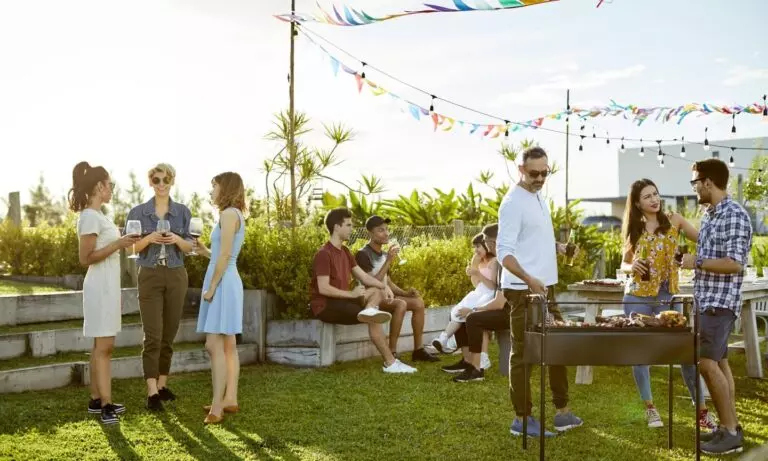Phil Levin and Kristen Berman, their girlfriend, were faced with a common dilemma seven years ago: Should they move in together?
Levin thought they would follow a predictable route and find an apartment in a less expensive area of San Francisco. Berman, a behavioral scientist and Levin’s friend, expressed her reservations about leaving their friends network. Here are some facts.
Levin states, “All behavioral science research has shown that this is one of the most detrimental things you can do to your happiness.”
Instead, they rented a Victorian-era home in San Francisco’s Hayes Valley and invited nine of their friends to move in. Today, Radish, a multi-unit property in Oakland, California, is owned by the couple. It houses 17 adults as well as two infants.
It was not an easy task to find the right property or figure out the finances. The couple, now married, couldn’t have imagined a different way of designing their lives or raising their daughter.
Levin states that it was wonderful to have a large extended family of ‘aunties and ‘uncles’ nearby.
Many co-buyers work on a smaller scale. Co-buying is a complicated process that requires additional planning and paperwork, regardless of how small your group may be. Companionship can pay off if you are willing to be vulnerable about your finances, long-term goals and financial situation.
Keep your mind open
The 2022 Profile of Home Sellers and Buyers of the National Association of Realtors revealed that a record-breaking 5% of first-time buyers were from “other household compositions,” which is something other than single, married, or coupled.
Don Koonce, a Seattle real estate agent, says that co-buyers can be great and an opportunity to enter a market they might not otherwise be able to. He has assisted dozens of buyers over his eight years as a realty agent.
Koonce often works with platonic friends, who have lived together for many years. They are as varied as the homes they purchase, which can range from single-family homes to condominiums and duplexes.
Your group size and tolerance for shared space will determine the right home. Koonce suggests that basements are a great option for creating separate living areas or remodeling existing homes.
Koonce recently assisted a mother-daughter team to purchase a split-level home that they converted into two separate units with separate kitchens.
He said, “It was gorgeous.” “I don’t see any problem selling it, as somebody could rent it span>
Stress-test your relationship
For family members and roommates with experience, co-buying increases the risk.
Ashley Agnew, an investment advisor and financial counselor with Centerpoint Advisors in Needham Massachusetts, is a wealth management company. She role-plays the worst case scenarios in order to stress test the relationship with co-buyers. This includes how they would handle major home repairs and theft.
She says, “You have to be a bit more financially naked than the person you are buying from.” “There must be a lot more transparency.”
Agnew recommends co-buyers consult legal counsel. A cohabitation agreement can be drafted by an estate attorney. This is not only for romantic partners. This way, everyone knows what to do if one party wants to end the homeownership agreement.
Agnew states that it is almost like owning a small business, particularly if it isn’t a coupleship.
A co-buyer can be helped by an estate attorney to understand the options for titling their home. This could include joint tenancy and tenancy in common. Each arrangement comes with its pros and cons, as well as legal obligations.
Search the best resources
It’s crucial to find a lender who is familiar with the needs of co-buyers in order to make your dreams a reality. Koonce said that this is often the biggest hurdle. Co-buyers are also a problem for some realtors.
He says that it takes a lot of paperwork and a lot more coordination to get people to come together.
Koonce was awarded a CoBuy professional certification to provide better service. CoBuy offers training for real estate agents, lawyers, and lenders as well as services to co-buyers.
Levin received a flood of questions about co-living and co-buying after establishing Radish. This interest revealed a gap in information: People wanted trusted guidance on how to achieve this success.
Levin and Gillian Morris, a close friend, co-founded Substack newsletter Supernuclear in 2020. It offers advice, templates, and tools for navigating common problems of co-living and co-buying.
Levin states, “We didn’t invent this idea.” “We are sort of standing on other people’s shoulders, so there is sort of a pay it forward element where we wanted other people to experience the happiness and meaning we have. ”
This article was originally published by The Associated Press and was written by NerdWallet.
